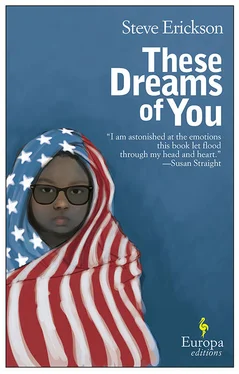Brown says, “Another vodka, then?”
“No,” says Zan.
“This story is somehow directed at me, I take it?”
“I’m not sure anymore,” Zan says sincerely, “but then I’m not finished. Let me finish and we’ll decide.”
“Lovely,” Brown shifts in his chair.
“There’s two points, really, one I was trying to make to Viv, whose culpability in the matter of whatever happened to the woman who may or may not be Zema’s mother—”
“Whose?”
“—Sheba’s mother is far less than mine in the whole Ronnie Jack Flowers affair, and that point is, Viv is responsible for doing what she can to make things right, but she can’t hold herself responsible for how things turn out, because we live in a world where sometimes the right thing is just not going to turn out. The other point has to do with Ronnie himself, who I saw being interviewed on a ‘news’ cable channel, if you can call this particular channel such a thing, while we were waiting in the airport to come to London and for Viv to go on to Ethiopia.”
Brown says, “He’s become a prominent figure, then.”
“Now,” Zan explains, “he’s vice-chairman or co-director for something called Civic Organizers Network, and his politics are as far to the right as they once were to the left. And here’s the thing — Ronnie hasn’t changed at all, as far as I can tell. Because the specific content of his views is beside the point. The point is the totalitarian pathology, the pathology of zealotry or, if you want to put it in more secular terms, ideology. Because what the zealot or ideologue really believes in is the zealous nature itself, the devout embrace of hard distinctions — the crusade against gray. It’s a story as old as the original novel, historical or not — the Damascan convert. The completely adamant non-believer who becomes the believer, and the thing that hasn’t altered an iota is his adamancy.”
“Not to mention that perhaps this chap’s politics were always as opportunistic as you suspected.”
“That’s not for me to say, and it takes me off the hook for nothing.”
“I think perhaps this story,” says Brown, “is less about my zealotry, as you’ve characterized it — that part, I assume, is directed at me — and more about why you haven’t written a novel since.”
“Touché,” says Zan, lifting to him the empty vodka glass. “I would drink to you if my glass weren’t empty.”
“I offered you another, didn’t I?” Brown points out. “And I assume this new novel you’re writing now,” he continues, gesturing in the direction of Zan’s daughter digging into her fish and chips, “is about a white man raising a black daughter at the same time a black bloke is president of his country?”
Zan is shocked. “Of course not.”
“Why not?”
“Because there are things about race that no white person can understand. Because no white author has the moral authority, not to mention insight or wisdom, to write such a book. Don’t be daft, as you Brits would say.”
They get to the station in time for the night’s last express back to London. On the platform the two men shake hands; Brown watches the nanny pull Sheba onto the train, Parker leading the way. “So it’s working out, then,” Brown says.
“I think so,” Zan answers. “In the back of her four-year-old little brain is always the question whether we’ll be one more family who sends her away. So everything’s a test, of course, to see if she can push us to do it.”
“Oh,” says Brown, “yes, quite. I meant the nanny, what’s her name.”
“Molly.”
“Molly, right. Odd name for an African bird, isn’t it? I assume that’s what she is, African. I meant you worked it out with the child-care.”
“It’s strange,” Zan says, the train starting to move, “because we actually saw her, the afternoon before she came to the room, in a. . peculiar way. . at the pub where. . wait,” he says, stepping onto the train, “what?”
“How’s that?” says Brown, walking alongside, trying to keep pace.
“ I worked it out? Didn’t you work it out?”
“Uh,” the other man says, the train speeding up and leaving him behind, “you know I intended to, but. . ”
“But I thought you arranged it,” Zan calls from the train.
“Have a good rest of your stay,” Brown calls back, waving. “Regards to Viv, if you hear from her.”
Did he say if? Over the building roar of the train, Zan strains to hear the word’s echo: Or maybe he said when. Was it when, or if? A few minutes later in their seats, Molly says, “No, it was Mrs. Nordhoc who arranged it. Sorry. I thought you understood.” On the seat beside her sits a small portable radio; a blip of music comes from its speaker. When the nanny holds the radio up to Sheba’s head, the signal comes through more clearly. In fascination Parker stares not at the effect his sister has on the transistor but the obsolete device itself. “That radio looks as old as your camera,” he murmurs before sinking back in his seat to the slight sway of the train.
Zan says to the nanny, “Viv arranged it?” Sheba is about to fall asleep, her eyes drooping. “Don’t let her fall asleep,” says Parker to Molly.
“Parker,” Zan says to the boy’s tone, but then to the woman, “I’m afraid he’s right. She’ll nap half an hour and be up the rest of the night. They’ve still got some jetlag anyway.” Molly rustles Sheba a few blinks back into consciousness, turning up the radio in the seat beside her; she moves the knob from station to station until she finds the song. Sheba’s head perks up. “Oh my god, seriously?” Parker groans from half-sleep; Sheba looks at Molly and smiles. We can be heroes just for one day. “I like this song!” says Sheba.
“I know,” Molly smiles back.
You know? thinks Zan. “You heard from Viv?”
“Well,” the nanny seems to sort through her sentences over the song, “not directly. Through a friend. A friend of a friend in Addis.” She sings softly along with Sheba and stares out the window of the train.
“But when?” says Zan.
“A few days ago, I think it was?” She says, “No, of course it must have been longer than that. A week or more?”
“A friend of a friend? Can I contact this person?”
“It’s difficult,” Molly nods, “very poor mobile service, you know, and email. . ” and turns back to the window.
“I ask because I haven’t heard anything from her in days.”
“I am certain that she is all right,” Molly answers,
“as long as she remains in Addis Ababa.”
It may be that Zan has made an aesthetic out of coincidence, but he would find Molly’s appearance more reassuring if it somehow were more explicable. He would feel more reassured if Zan had mentioned in the email to Viv the need for a nanny before the afternoon they saw Molly outside the pub. In that case Zan can imagine scenarios, slightly far-flung though all of them are, by which a young London woman — alerted to the situation of a white foreigner in town with two kids, one a young black girl — would happen to pass by the pub and take notice. But in any case, wouldn’t Viv have written something? Maybe, as Molly indicated, Viv said something to someone in Ethiopia, who then said, Oh I know a woman in London, and then Viv forgot in the midst of everything going on. As Zan too often reminds her, sometimes she thinks of telling him something and then later remembers doing it though she hasn’t.
Читать дальше











